The Best Dog Teeth Cleaning Toys: Our Top 8 Picks Reviewed
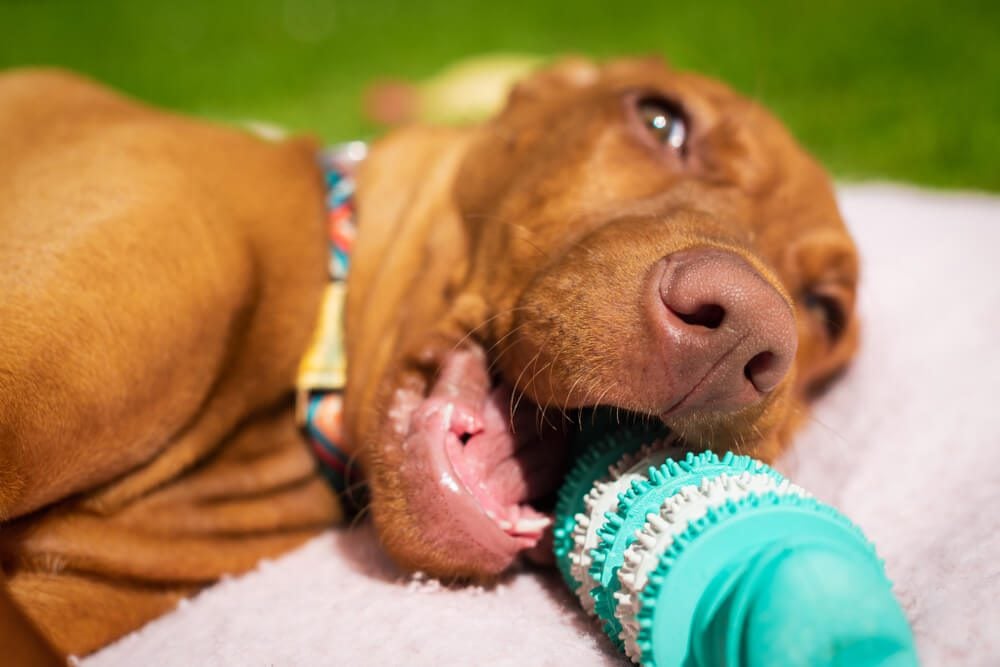
Table of Contents
What Toys Are Good for Cleaning Dogs Teeth?
- Most Overall Dog Teeth Cleaning Toy: PetSafe Busy Buddy Bristle Bone Treat-Holding Toy for Dogs
This toy requires dogs to spin the wheel and chew hard to reach the treat at the center, thus encouraging mental stimulation. - Most Unique Dog Teeth Cleaning Toy: Arm & Hammer for Treadz Dental Chew Toy for Dogs
The animal shapes this toy is available in feature varying textures to keep dogs engaged and keep their teeth clean. - Best Dog Teeth Cleaning Toy for Gum Stimulation: Pamlulu Dog Chew Toy Toothbrush Stick
The tall soft rubber spikes on this toy are perfect for reaching the gums and massaging them to stimulate blood flow. - Best Multifunctional Dog Teeth Cleaning Toy: Feixun Dog Tooth Cleaning Toy Ball
This toy can be used for dental cleaning and interactive games like fetch, thus being practical and multifunctional. - Most Affordable Dog Teeth Cleaning Toy: Arm & Hammer Ora-Play T-Bone Dental Chew Toy for Dogs
Priced at under $6.00, this is the cheapest dog toy that can be used to clean the dog’s teeth and support oral health. - Most Enticing Dog Teeth Cleaning Toy: Moonshuttle Squeaky Cleaning Teeth Dog Chewing Toy
The squeaking noise and varied texture of this toy make it a delight to chew on for long periods of time. - Best Scented Dog Teeth Cleaning Toy: POAGL Dog Chew Toys Toothbrush for Aggressive Chewers
The scent of milk and coconut is infused into this toy to keep dogs chewing, thus supporting oral health and dental hygiene. - Best Dog Teeth Cleaning Toy for Aggressive Chewers: Petizer Dog Squeaky Chew Toys for Aggressive Chewers
Very durable chew toy that features a groove for toothpaste and treats and cleans the teeth during playtime.
- Includes rubber nubs and nylon bristles to help stimulate gums and keep teeth clean
- 3 chewing surfaces for your dog to gnaw on; includes 4 Busy Buddy treat ring refills (additional treat ring refills available separately)
- Made from durable nylon and heavy-duty rubber, this toy is designed to withstand a strong chewer
What Are Teeth Cleaning Toys for Dogs?
The dog teeth cleaning toy is a pet tool made for a dog’s amusement that works to improve dental health by providing an interactive form of dental care in the act of chewing or gnawing.
Typically teeth-cleaning dog toys are made of things like bully sticks, natural rubber, or high-quality nylon, like Nylabone.
If you do not have time to brush your dog’s teeth or it dislikes the dog toothbrush, these toys are an excellent alternative.
Do Dog Teeth Cleaning Toys Work?
Yes, the dog teeth-cleaning toy works.
Dog teeth cleaning toys often have raised nubs that work in between the teeth when a dog chews. These nubs scrape against the gumline to stimulate blood circulation and promote strong, healthy gums.
By doing this, the dog teeth cleaning toy can remove plaque & tartar buildup, freshen bad breath, and improve overall oral hygiene.
What Are the Benefits of Dog Teeth Cleaning Toys?
There are several benefits of using dog teeth-cleaning toy.
- Fresh Breath. Fresh breath is a sign of good oral hygiene. When a dog’s breath smells clean, it is generally because its mouth is clean. A clean mouth is much less likely to develop problems over time than a dirty mouth because the bacteria associated with having a dirty mouth and bad breath are often also associated with cavities, gum disease, and an array of adverse impacts on a dog’s health.
- Clean Teeth. Cleaner teeth are stronger teeth, and stronger teeth are imperative to a good quality of life. Keeping teeth clean does not have to be difficult, but it is something that needs to be done regularly for the best results and to avoid some expensive vet bills in the future.
- Disease Prevention. Preventing dental issues before they start is the best way to combat things like tooth decay, gum disease, and periodontal disease. Cleaning a dog’s mouth regularly will prevent the buildup of bacteria, tartar, and plaque that can inflame and damage gums and teeth.
The Best Dog Teeth Cleaning Toys Reviewed
Finding the right dog teeth-cleaning toy can be challenging. To make the search easier, we selected and reviewed the best teeth-cleaning dog toys on the market.
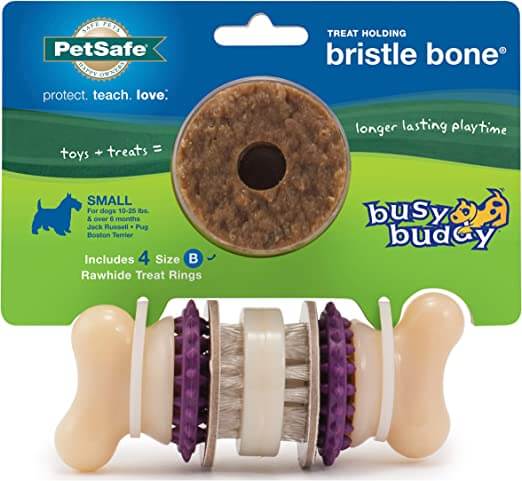
Summary: The puzzle design of this toothbrush toy keeps dogs busy for lengthy periods of time and helps to ease anxious behavior and boredom. Its 3-in-1 cleaning action features bristles to clean teeth and heavy-duty rubber nubs for strong gums. It comes with extra chewy treat discs that are meant to keep the dog entertained and coming back for more. It is dishwasher safe, so cleaning it is a breeze.
Best for: Dogs of all ages
Features: Toothbrush in a toy; made of durable nylon and heavy-duty rubber; dishwasher safe; puzzle design
- Available in sizes for every dog
- Dishwasher safe
- Brushes teeth while they chew
- Includes treat discs for extra playtime
- Rubber nubs stimulate gums a
- Maintains good oral health
- The rubber wheel can come off and may be easily swallowed
Review: Most pet parents were happy with this dog teeth-cleaning toy. They say their dogs are entertained for long periods, and they can see a noticeable difference in the health of their dog’s teeth and gums. Other consumers were concerned about possible choking hazards from the toy. They said their dogs were able to unscrew the toy, and the components by themselves may be easily swallowed.
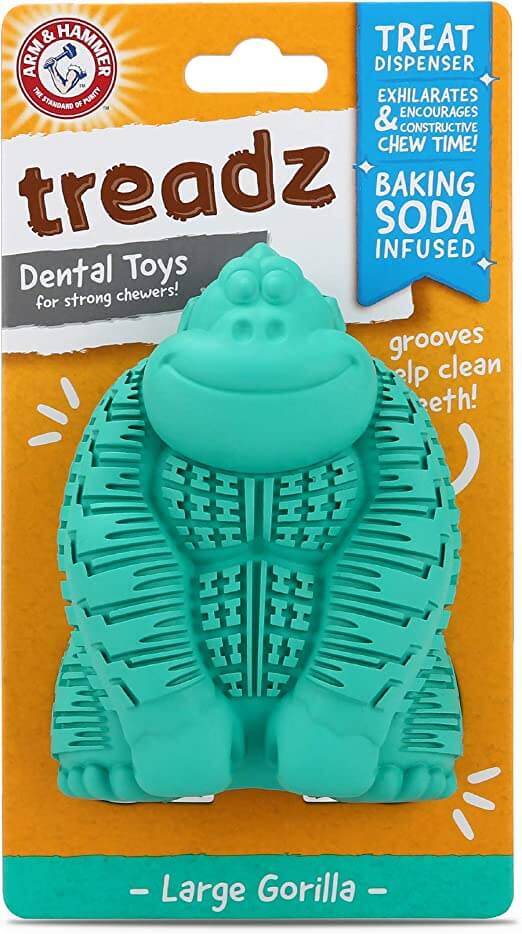
Summary: This dental dog toy is infused with baking soda to whiten teeth and freshen breath. It is ideal for small dogs and medium dogs, with the largest size being designed for dogs up to 35 pounds. It is made of durable, heavy-duty rubber to withstand aggressive chewing and features deep grooves and nubs so teeth can sink into them, allowing the toy to thoroughly clean the dog’s teeth. It is offered in various styles, so you can put them in a rotation to keep your dog from becoming bored with them.
Best for: Dogs of all ages
Features: Made from all-natural rubber; designed with grooves to clean teeth and stimulate gums; infused with baking soda for whiter, cleaner teeth
- Available in a multi-pack
- Infused with baking soda for whiter, cleaner teeth
- Dishwasher safe
- Deep grooves to help remove plaque and tartar
- Several different styles to choose from
- Suitable only for dogs up to 35 lbs
Review: Most customers were satisfied with this dog teeth-cleaning toy. They said it was a great option for the price, and their dogs were able to chew on it and enjoy it for long periods of time. Other customers were unhappy to see that their dog had chewed through the toy in a short period of time. Many who did had swallowed some of the toys, and a few had to go to the vet to have the pieces of the toy removed.
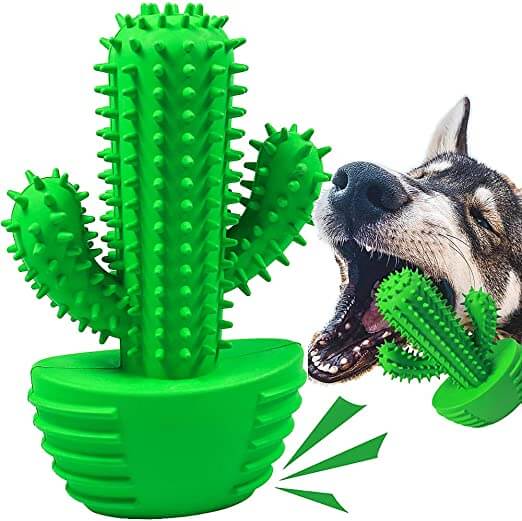
Summary: This soft matte rubber dog teeth-cleaning toy features a squeaker that encourages dogs to bite hard. A toothbrush stick is included to keep your dog’s oral hygiene top-notch. The rubber spikes on the cactus are designed to get up to the gums and massage them, making it a good teething toy as well. It comes with a worry-free 2-year return guarantee that allows you to return the toy if dissatisfied within two years.
Best for: Dogs of all ages
Features: Squeaker; toothbrush stick; made of natural rubber; soft matte texture
- Has a squeaker to keep dogs entertained
- Uses a toothbrush stick to help clean teeth
- Includes a 2-year return policy
- Rubber spikes massage gums
- Excellent tool for teething puppies
- Dishwasher safe
- Not available for small dogs
Review: Reviews on this dog teeth cleaning toy were mixed, with only 58% of total reviews on Amazon being 4 or 5 stars. Most customers were happy with the durability and said their aggressive chewers didn’t tear this toy apart immediately. They liked the squeaker in the bottom as it encouraged their dog to really chew on it. Other buyers were upset at how easy it was for their dog to chew the nubs off and destroy the squeaker.
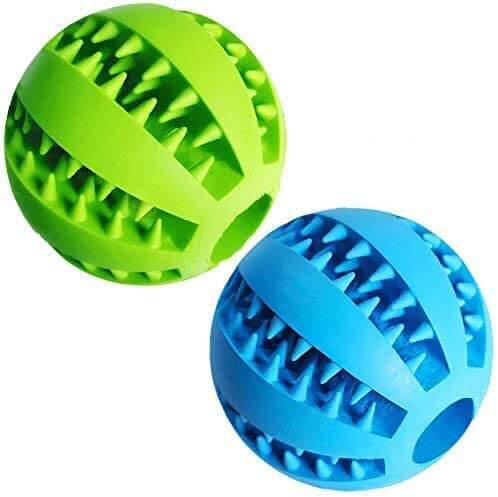
Summary: This very affordable dog teeth-cleaning toy features deep grooves and rubber spikes to help prevent tartar buildup. The grooves can hold kibble or treat to encourage longer chewing sessions. It is made of non-toxic and all-natural rubber, so it is safe for dogs to chew on for long periods. The round shape and deep grooves provide mental stimulation and offer physical exercise during fetch.
Best for: Dogs of all ages
Features: Includes multiple balls; made of non-toxic, all-natural rubber; abrasive spikes set in deep grooves to clean teeth and gums; grooves are made to hold treats
- Includes multiple balls
- Encourages mental stimulation
- Deep grooves are great at holding treats to encourage longer chewing
- Can be used for fetch and other games
- Affordable
- Ball may emit a chemical odor when new
Review: Owners of dogs of all sizes say this ball is great for their pets. Pitbull and Retriever owners were happy with its durability and said it was a great source of multi-faceted fun. They could put treats in the grooves and let the dog entertain themself or take them outside and use them for fetch. Other pet owners were disappointed to see their dog had quickly chewed the dog teeth cleaning toy to pieces and said there was a strong chemical odor coming off the ball.
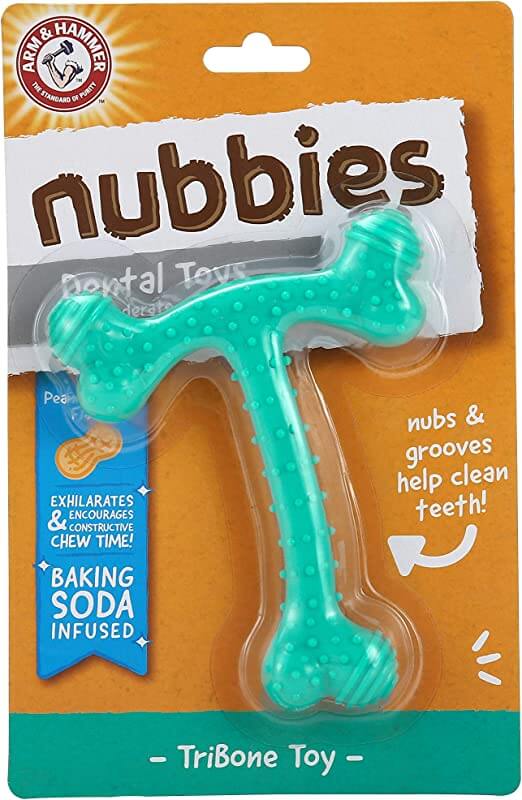
Summary: The durable nylon construction of this dog teeth-cleaning toy is meant to last through tough chewing sessions from the most aggressive chewers. It is made for dogs up to 35 lbs. and has a peanut butter flavor to keep dogs wanting more. It is infused with baking soda to help whiten teeth, freshen breath, and clean the mouth. The ergonomic shape helps dogs keep a tight grip on it when really digging into it with their teeth to optimize the cleaning effect.
Best for: Dogs of all ages
Features: Nubs and grooves to keep teeth clean; baking soda infused
- Very affordable
- Infused with baking soda for whiter, healthier teeth
- Peanut butter flavor keeps dogs entertained
- Available in a large multi-pack
- Made of durable nylon for aggressive chewers
- Meant for dogs up to 35 lbs
Review: Most positive reviews were left by owners of puppies who were teething. They said this dog teeth cleaning toy did wonders to curb their puppy’s destructive teething behavior and soothe their gums. Unhappy consumers complained this toy was dangerous and had a tendency to develop sharp pointed spikes that cut the gums of their dogs.
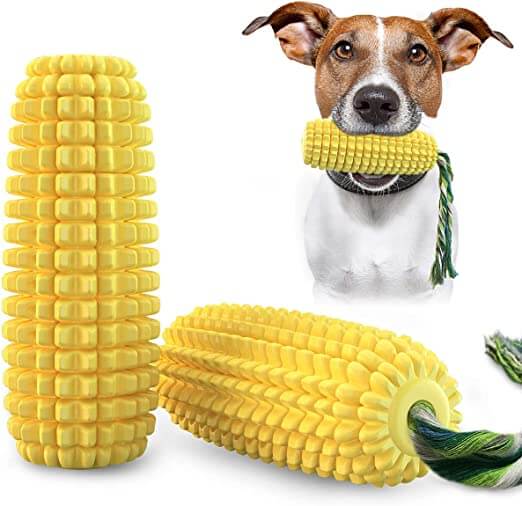
Summary: This corn-on-the-cob dog teeth-cleaning toy is made with varying-shaped teeth to clean all areas of the teeth and gums effectively. There are holes along the side, so you can put peanut butter inside the toy to entice your dog or toothpaste to offer extra cleaning for your pet’s teeth. It is available with a short and long rope and in a tug-of-war, designed to promote great mental stimulation. The rope is made of tear-resistant cotton, and the chewy part is made of bite-resistant rubber. As a bonus, it squeaks as the dog chews to encourage it to chew longer and harder than last time.
Best for: Dogs of all ages
Features: Available in multiple options; bite and tear-resistant; squeaker
- Available in three options
- Bite and tear-resistant
- Elongated design is made to reach the hardest-to-reach teeth
- Holes to allow toothpaste or peanut butter to be added
- Varied teeth designs help to clean all areas of the tooth and gum
- The squeaker might not withstand aggressive chewing like the rest of the toy can
Review: Most buyers were very happy with this product. Numerous reviewers called this the “best dog toy ever” and encouraged other dog owners to buy one for themselves. The most repeated complaint, however, was that the squeaker died soon after giving the dog teeth cleaning toy to their dog.
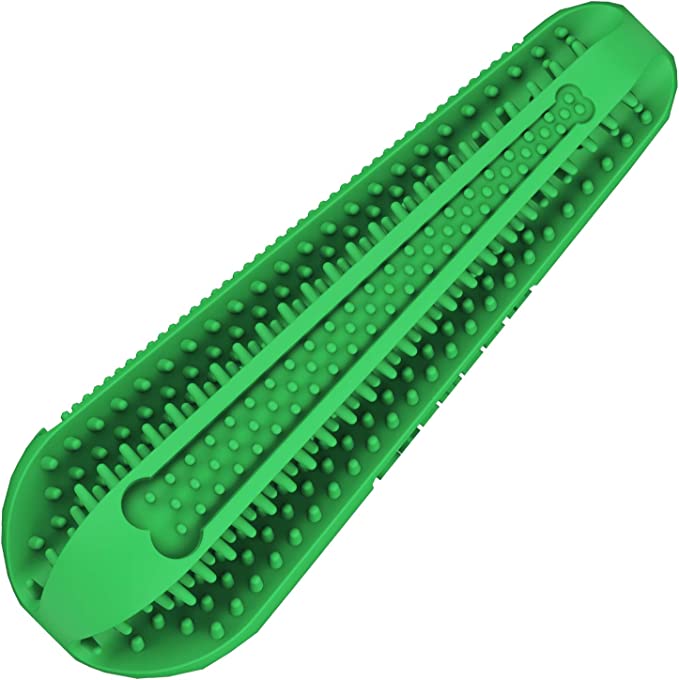
Summary: This toothbrush toy was designed and developed in the USA for dogs who require daily toothbrushing. It has a hole in the center of the stick in which you put toothpaste, so your dog is receiving great oral hygiene care on a regular basis through chewing. The event, sturdy rubber bristles massage the gums and wipe tartar from teeth. It is lightly scented with milk and coconut to be enticing to dogs and is made of non-toxic rubber that has been upgraded to withstand more chewing and punishment.
Best for: Dogs of all ages
Features: Light milk coconut scent; made of non-toxic rubber; deep grooves allow the toy to reach the gums; holds dog toothpaste in the center
- Lightly scented with milk and coconut
- Deep grooves allow the toy to reach the gums
- Holds toothpaste in the center of the toy
- Complies with US child toy safety standards
- Designed and developed in the USA
- Not dishwasher safe
Review: There were only two reviews of this dog teeth-cleaning toy. Both stated their smaller dogs were able to chew one of the ends off quickly after it was given to them.
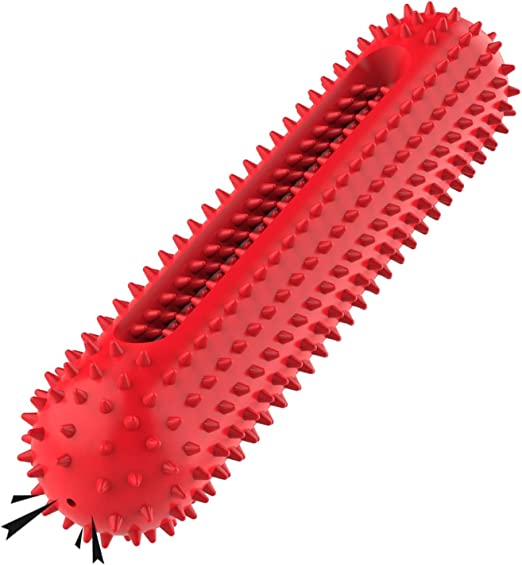
Summary: This dog teeth-cleaning toy features a groove in the center for toothpaste or treats to keep dogs chewing longer. The squeaker inside the toy encourages dogs to chew more aggressively, which helps this toy more thoroughly clean its teeth. It has specially aligned bristles that are arranged to massage the gums and clean the teeth effectively while allowing the toothpaste room to work. It is specifically designed for medium and large-breed dogs.
Best for: Dogs of all ages
Features: Squeaker; made of 100% natural rubber; beef-flavored, 1-year warranty; toothpaste groove
- Features a toothpaste groove for greater cleaning
- Squeaker keeps dogs entertained
- Rubber bristles clean teeth without being too aggressive
- Food-grade beef flavor
- Especially aligned bristles massage gums and clean teeth
- Made of 100% all-natural non-toxic rubber
- Not suitable for small dogs
Review: Owners of medium and large dogs were glad to see these dog teeth-cleaning toys stand up to their tough chewers. Many exclaimed they were relieved to finally find a toy that could tolerate their dog’s aggressive chewing and were happy that this toy doubles as a dental cleaning product. The most common complaint, however, was in direct opposition to the positive reviews. These consumers said the toy was not durable at all, and their dog had ruined it within minutes.
How do You Clean a Dog’s Teeth with Toys?
Cleaning your dog’s teeth with a dental hygiene dog toy is often not a difficult process. Many dogs will automatically start chewing on the pet toy as soon as you hand it to them but not every dog.
For dogs who are harder to coax, you may need to purchase a dental toy that encourages chewing. Things like kongs are great options because they are able to be filled with peanut butter or any treat of your dog’s choosing.
You may also need to smother something like a Benebone in peanut butter to encourage them to eat and reap the benefits of the dental dog toy. Some dog dental chew toys include a squeaker in the middle to encourage hard biting. This allows the toy to thoroughly clean in and around the dog’s teeth.
Treat-motivated dogs may not immediately take to the toy, and you may need to present it like a treat. For instance, use it when training to “trick” your dog into thinking it is receiving a treat.
Have your dog perform a task and give the dental toy to them, perhaps covered in peanut butter or accompanied by another treat. Over time, remove the treat and offer only the toy. This can help your dog think it is receiving what it wants rather than receiving a toy.
What Should I Look for in Teeth Cleaning Toys for Dogs?
When looking for the best dog teeth-cleaning toy, you should consider the following factors and features:
- The Teeth Cleaning Action. There are numerous ways a toy can clean teeth. Some toys are made to be filled with things like dog treats and peanut butter for taste or toothpaste for oral care. The action you choose will depend on what your dog prefers, and this may take some trial and error to figure out.
- Size. If your dog is small, a large dental toy likely won’t be the best option. This can make it uncomfortable for your dog to chew, and they will lose interest before the toy has had a chance to do its job. If your dog is large, a small dental toy may present a choking hazard. These toys are made to encourage heavy chewing, and accidental swallowing of the toy is a real possibility if it is not the right size for your dog.
- Durability. For dogs who are aggressive chewers, something like a Nylabone or Benebone may be the best option. These toys are highly durable and great at strengthening gums and cleaning teeth with raised nubs. As the dog chews the toy, it becomes more and more aggressive in its teeth-cleaning action because the edges become sharper and more angled. This makes it better at reaching the hard places in the mouth.


















